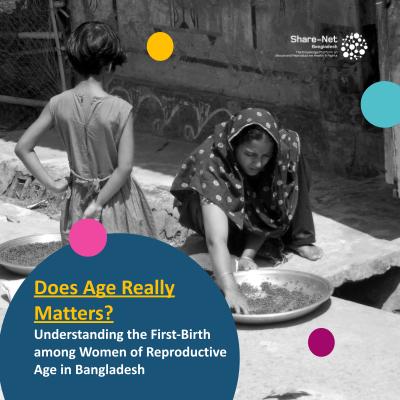Does Age Really Matter? Understanding the First-Birth among Women of Reproductive Age in Bangladesh
In Bangladesh, the reproductive age of women spans from 15 to 49 years, a critical period marked by significant health and social challenges. Despite improvements, the country still grapples with high rates of early pregnancies, with about 55% of women having their first child before age 18. This early childbearing contributes to maternal mortality, with many women facing life-threatening complications during their first birth.
A groundbreaking study by Abdus Sobhan, Mohammed Moinuddin, and Md. Moyazzem Hossain sheds light on the timing of first births among women in Bangladesh. Using data from the BDHS 2017/18, the research reveals crucial socio-economic and demographic factors, offering vital insights for enhancing sexual and reproductive health and rights (SRHR) policies.
In Bangladesh, the average age at first birth has significant implications for both maternal and child health. According to the Bangladesh Demographic and Health Survey (BDHS) 2017/18, about 55% of women had their first child before the age of 18. This early age of motherhood is linked to several socio-economic and health challenges.
“Women who give birth at a younger age may be at increased risk of complications during pregnancy and childbirth, and their children may also be at higher risk of poor health outcomes,” highlights the study. Delving into this issue, the research utilized survival analysis techniques to identify influential factors affecting the timing of first birth among ever-married women aged 15–49 in Bangladesh.
Key Findings
The study found significant regional variations and socio-economic determinants affecting the age at first birth. Women in urban areas tend to have their first child at an older age compared to those in rural regions. For instance, women from Dhaka and Sylhet regions have higher mean ages at first birth than those from other regions.
Influential Factors
Several factors were identified as significant determinants of the age at first birth:
- Education: Women with higher education levels tend to delay their first birth. Those with no education, primary, and secondary education had 28%, 38%, and 29% shorter ages at first birth, respectively, than higher educated women.
- Residence: Rural women are more likely to have their first child earlier than urban women, with a 5% smaller age at first birth (aHR 1.05; 95% CI 1.01–1.10).
- Mass Media Exposure: Women with no exposure to mass media tend to have their first child earlier by 27% (aHR 1.27; 95% CI 1.10–1.47) compared to those who are media-exposed.
- Marriage and Sexual Initiation Age: Early marriage and early age at first sexual intercourse are strongly associated with early first births.
Implications for Policy
The study emphasizes the need for policies that delay the age of first birth to improve maternal and child health outcomes. It suggests that increasing educational opportunities for girls, enhancing access to family planning services, and promoting reproductive health awareness through mass media can significantly impact the timing of first births.
Programs targeting early childbearing can contribute to achieving Sustainable Development Goal-3 (SDG-3), which aims to ensure healthy lives and promote well-being for all ages.
Conclusion
By addressing the socio-economic and regional disparities in the age at first birth, policymakers can design effective interventions to reduce child mortality and improve maternal health. The findings of this study provide a valuable resource for developing strategies to delay first births and support women’s health and well-being in Bangladesh.
The study’s findings highlight the need to delay first births to improve maternal and child health outcomes. By pinpointing key determinants, this research equips policymakers with the information needed to craft targeted interventions, ultimately advancing SRHR and supporting Bangladesh’s sustainable development goals.
Source: BioMed Central (BMC)
Picture Credit: Priom on Unsplash
Researcher Profiles:
- Abdus Sobhan, Chief Economist’s Unit, Bangladesh Bank
- Mohammed Moinuddin, School of Medicine and Dentistry, University of Central Lancashire
- Md. Moyazzem Hossain, Department of Statistics and Data Science,
Jahangirnagar University
